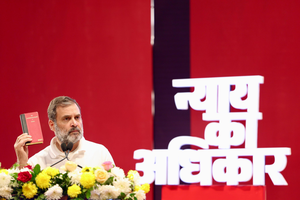As Army Chief, Gen Dwivedi likely to address both external as well as internal security challenges
New Delhi: Lt Gen Upendra Dwivedi, PVSM, AVSM, who is currently serving as the 46th Vice Chief of the Army Staff, with vast operational experience in dealing with China and Pakistan, has been appointed as the next Chief of the Army Staff with effect from the afternoon of June 30. He will succeed General Manoj Pande, the 29th and the current Chief of the Army Staff of the Indian Army. Lt Gen Dwivedi, born on July 1, 1964, is an alumnus of Sainik School, Rewa, Madhya Pradesh, the National Defence Academy, Khadakwasla and then the Indian Military Academy, Dehradun. The COAS (Designate) was commissioned into the 18th Battalion of the Jammu and Kashmir Rifles Regiment of the Indian Army on December 15, 1984, from the Indian Military Academy. He later commanded the same Battalion at Chowkibal in Kashmir Valley during Operation Rakshak and the deserts of Rajasthan. As a Sector Commander, he commanded a Sector of the Assam Rifles in Manipur during Operation Rhino, served in Assam as Inspector General of Assam Rifles (East), and held various other Staff & Command appointments in the North East. He has had a unique distinction of balanced exposure to both Northern and Western Theatres in India. The General Officer has held several important command, staff, instructional, and foreign assignments throughout his nearly 40-year-long distinguished career prior to his appointment as the Chief of the Army Staff. During his illustrious career, Lieutenant General Upendra Dwivedi has tenanted various staff appointments in Headquarters Armored Brigade, Mountain Division, Strike Corps and Integrated HQ, MoD (Army). Among his previous appointments were as an instructor at the Indian Military Academy, directing staff at the higher command wing in the Army War College, Mhow where he shaped the future leaders of the three services of the Indian Armed Forces and Friendly Foreign Countries in ‘ Art of Warfare’ and ‘ Military Leadership’. His two overseas tenures include Somalia, as part of HQ UNOSOM II and Military Attache to the Government of Seychelles. As Director General Infantry, he fast-tracked the long pending Capital procurement of modern and state-of-the-art weapons for all three services thereby enhancing the combat capabilities of the Indian Armed Forces. In February 2020, the General was appointed as a commander of a Corps. A year later in April 2021, he took over as the Deputy Chief of the Army Staff (Information Systems and Coordination) wherein he provided an impetus to automation and absorption of niche tech in the Indian Army. On February 1, 2022, Lieutenant General Upendra Dwivedi took over as the General Officer Commanding in Chief, Northern Command. Being a technology enthusiast, he worked towards enhancing the tech threshold of all ranks in Northern Command and pushed for critical & emerging Technologies like big data analytics, artificial Intelligence, quantum and blockchain-based solutions. He was also involved in modernisation and equipping of the largest Army Command of the Indian Army, where he drove the induction of Indigenous equipment as part of Atmanirbhar Bharat. He synergised with the people of Jammu, Kashmir and Ladakh for convergent nation-building and infrastructure development. On February 19, 2024, Lieutenant General Upendra Dwivedi took over as the 46th Vice Chief of Army Staff. An alumnus of the Defence Services Staff College, Wellington, Tamil Nadu & Higher Command Course at Army War College, Mhow, the National Defence College and the US Army War College in Carlisle, USA, where he received the award of ‘Distinguished Fellow’, the General Officer has a M.Phil. in Defence & Management Studies, two Masters Degrees in Strategic Studies and Military Science, including one from United States Army War College. Lieutenant General Upendra Dwivedi has been honoured with the Param Vishisht Seva Medal, Ati Vishisht Seva Medal, and three General officer commanding-in-chief (GOC-in-C) Commendation Cards. As the Northern Army Commander, Lt Gen Upendra Dwivedi provided strategic guidance and operational oversight for sustained operations along the northern and western borders. He restored normalcy in Jammu and Kashmir by providing strategic directions for the successful conduct of effective counter-terrorism operations that led to the emergence of a conducive environment for infrastructure and socio-economic developments as also the smooth conduct of the G20 in Srinagar. The unprecedented tourist footfall of over 2.11 crores in 2023 in Kashmir Valley, besides the increasing economic activities, is a testimony of the General Officer’s professional acumen and commitment towards the national interest. During this period, he further enhanced India’s security architecture along the northern borders into robust defences in response to the extended stand-off triggered by China. He also actively participated in the ongoing negotiations with China to address the complex border issues. Playing a significant role in modernising and equipping the largest Indian Army command, he oversaw the induction of indigenous equipment as part of the Atmanirbhar Bharat (self-reliant India) initiative. General Pande, initially due to retire on May 31, was given a one-month extension, which sparked speculation within the military regarding a potential supersession and deviation from the seniority principle in the appointment of service chiefs. The standard procedure is to elevate either the highest-ranking Army commander or the Vice-Chief of the Army to the position of Army Chief upon the retirement of the current Chief of the Army Staff. Presently, Lt Gen Upendra Dwivedi, PVSM, AVSM holds the position of the most senior officer in the Army. In what seems like a well-orchestrated plan, some critics are still continuing with their tireless attacks on the ruling government for giving a one-month extension in service to Chief of the Army Staff General Manoj Pande by labelling it as an “unusual move” even though Modi 3.0, right at the start of its third consecutive term, has appointed Lt. Gen. Upendra Dwivedi as the next COAS with effect from the afternoon of June 30. Creating controversy out of thin air, many so-called ‘experts’ on defence matters tried to shape a particular narrative around the government’s decision, speculating that there could be plans in store to break the succession line by ignoring the seniority principle. The General Officer is married to Sunita Dwivedi, a science graduate, who is a homemaker. Sunita Dwivedi has been associated with Aarushi, an Institute for specially-abled children, at Bhopal. The couple is blessed with two daughters. The COVID-19 pandemic, Russia-Ukraine, Hamas-Israel conflicts and the strategic rivalry in the Indo-Pacific, especially the South China Sea occupy the centre stage of geopolitics and geo security presenting numerous challenges as also opportunities to India. Lt Gen Upendra Dwivedi would have his hands full as the COAS at a juncture where India marching ahead to be the third largest economy in the world in the foreseeable future is expected to address both external as well as internal security challenges so that the economy can ride on stability, normalcy and peace. As the 30th Chief of the Army Staff of the Indian Army, the following 10 major issues may merit focus in short, medium and long-term addressed at local, regional and global levels as relevant: Robust defences along the northern border; zero-terrorism/insurgency and hybrid warfare, especially in J&K and northeast respectively; normalcy in Manipur; secure Siliguri Corridor; operational effectiveness of the Agnipath scheme; ‘Atma Nirbhar Bharat’; counter China, especially in AI, auto/semi-auto weapon platforms, space, electromagnetic radiation, cyber, information warfare and precision-guided weapons; settle borders; effective surveillance; military diplomacy. (Maj Gen Sudhakar Jee, VSM (Retd) is a former colonel of the Mahar Regiment with over 37 years of service in the Indian Army) —






















